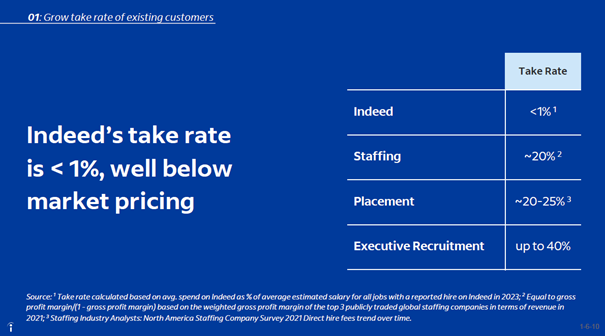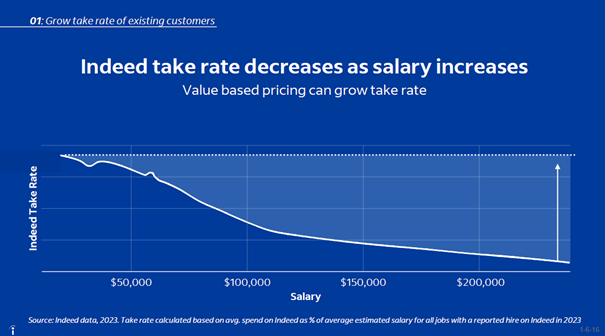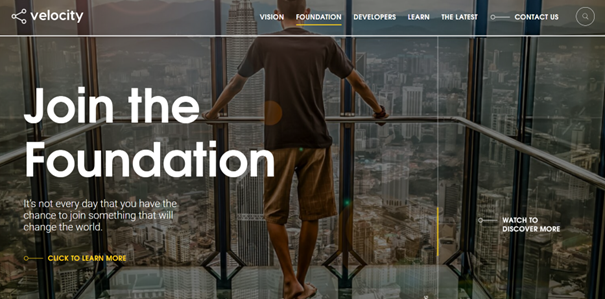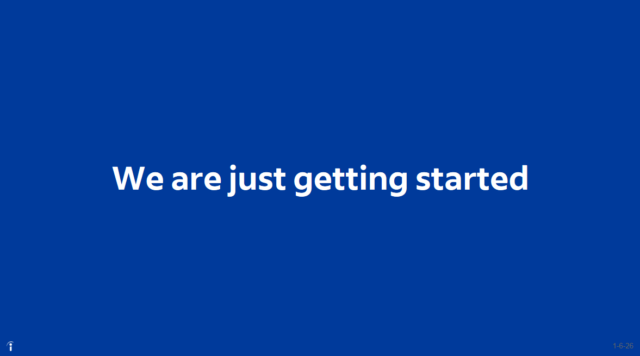
Could Indeed become Booking.com in the global job market? Chris Hyams, CEO of Indeed’s job platform, seems to think so. During the Recruit Holding Investor Update, he gave a remarkably interesting insight into his vision for the future (see the transcript and enclosed slides). He explains that in recruitment, the real money is earned in placement, where the ‘take rate’ is calculated as a percentage of the cost per hire divided by the candidate’s first-year salary. In the staffing industry, this typically ranges around 20%; for placement, it’s between 20-25%, and for executive recruitment, it can go up to 40%.

Indeed’s fees are well below 1%, while it is often responsible for more than 50% of hires. As the undisputed market leader in an industry that many agencies and employers rely on (just as they do on LinkedIn, Meta, and Google), Hyams has observed that they are leaving a lot of money on the table. Indeed has looked closely at platforms like Booking.com and Eat Takeaway, which charge commission rates of 13% to 30% of their suppliers’ revenue.
Indeed Could Charge Up to 10 Times More
Translating this to the job market, Indeed could charge up to 10 times more than it currently does. With its reach and new platform technology, candidates are increasingly finding Indeed. Indeed, it is better at binding and servicing them than employers and agencies. Moreover, on the vacancies with the highest margins (those with the highest salaries), Indeed earns hardly any money—while they are often decisive for success.
‘Indeed makes very little money on the vacancies with the highest margins – even though these are often the most crucial for success..’
It seems like a very sound idea from Indeed – as long as they continue to deliver value to candidates – that they should charge a higher success fee. Why not? If one sector has been able to push its prices up in recent years of scarcity, it’s the staffing industry. And after all, there’s still over 250 billion left over each year. With its new strategy and by contributing to success, Indeed is only looking to take a small slice of the pie. So why is the staffing industry reacting so indignantly?
The staffing industry is crying bloody murder
In the Chad & Cheese Podcast does Europe (and also in a previous podcast), the recent price adjustment of Indeed was discussed extensively. Whereas the company initially provided the entire market with free applicants, it has now started to charge more money year after year and provide fewer free services. Staffing agencies and the recruitment industry have continued to advertise and cooperate with Indeed year after year because alternatives (read: job boards) deliver fewer (good) candidates and add value.
And, of course, also because the summary costs do not outweigh the generous returns received from Indeed. Certainly, in Europe, where programmatic advertising still has to gain real traction, Indeed is a real winner in the labour market. It is no surprise to anyone in this industry that Indeed, just like LinkedIn, now wants to further capitalize on its market dominance. This could have been seen coming for years. Lieven van Nieuwenhuyze also agrees. Recruit Holdings, Indeed’s parent company, is also the fourth-largest staffing company in the world.
Crocodile tears
It may be especially painful for Van Nieuwenhuyze’s House of HR that their reliance on Indeed has become so great. After all, more than 50% of their inflow now comes from Indeed. And even then, House of HR is even less dependent on Indeed than average. That’s why I see the complaints about Indeed’s move as mostly crocodile tears. The industry has failed to develop alternatives or failed miserably in developing alternatives (such as Randstad with Monster). And now that the sector is on its knees with no manpower or budget to innovate, let alone the vision to respond or the trust to work together, Indeed is seizing its chance.
‘It is particularly painful for staffing agencies that their reliance on Indeed has become so great on average..’
One of the biggest problems staffing agencies ‘feel’ is that Indeed, through its platform strategy, is scooping up ‘the’ candidates who respond to ‘their’ vacancies. However, they overlook that a candidate always owns himself or herself and never belongs to an agency. Moreover, the average agency treats them very poorly as well. And they also forget that the vacancies belong to the employers they represent. So it’s borrowed content they’re making money from, not even their brand or ‘go-to-market’ strategy.
What options do recruitment agencies have?
I dare say that Indeed can increase its prices without any problem as long as it keeps the candidates engaged. Do I like this? No. Is it fair? Yes. So the question should not be: can we stop this? But rather, how do we respond to this? First of all, it won’t stop there. Booking.com also didn’t start at 30% commission. The screws are being tightened slowly. But that also gives enough time to react. Think:
- Collaborate with the entire industry, for example, to breathe new life into the 30-year-old Monster. The name is still strong, and new technology can be placed underneath it easily. But a new marketplace—with a different name—can also be a good option.
- Invest in own/joint talent pools and exchange talent (transfer system) between agencies. The set-up of thetalentpoolcommunity.nl offers an interesting approach to this, but also building on the collaboration in the Belgian work-id.be
- Go all-in on programmatic advertising and recruitment marketing automation.
Making Recruitment More Efficient
The rapid rise of fraud, fake agencies, fake recruiters, and fake job postings could signal the industry’s acceleration of development on HR Open Standards or its embrace of the global Velocity Network Foundation. This platform was founded by a consortium of large companies to improve interoperability between different HR systems and facilitate the exchange of HR data. This should make the application and recruitment process more efficient for employers and job seekers.
‘Once the crocodile tears have dried up, I think Indeed will simply continue to build on its leading position..’
But personally, I think that once the crocodile tears have dried up, Indeed will simply continue to build on its leading position. The only ones who can change this are candidates who find platforms outdated and use AI and Search 3.0 to find their new jobs. This development will again bring about a whole new dynamic and further drive the standardization of CVs/profiles. The question is whether Indeed has already thought about this… I wouldn’t be surprised if they have.
Also read











